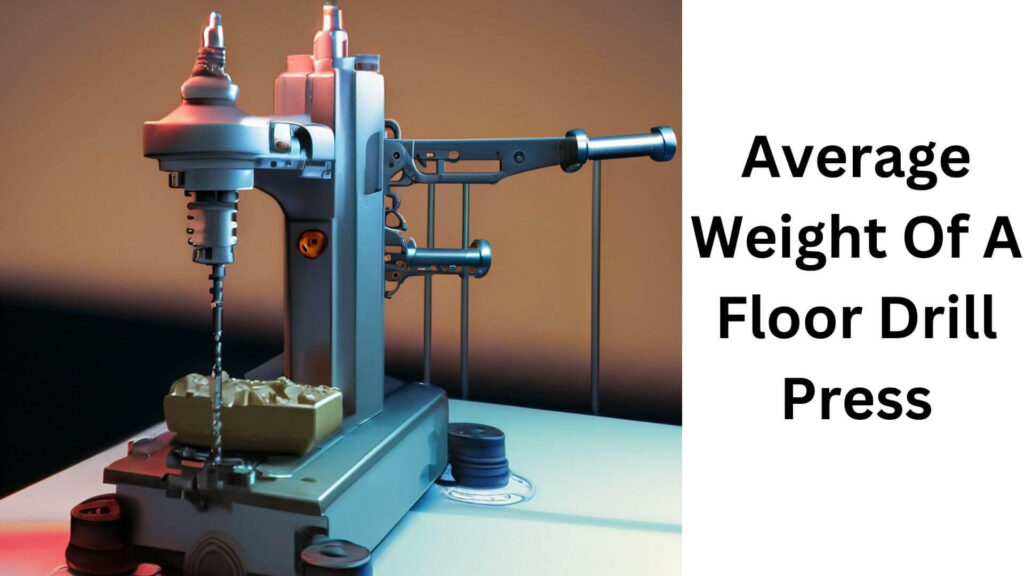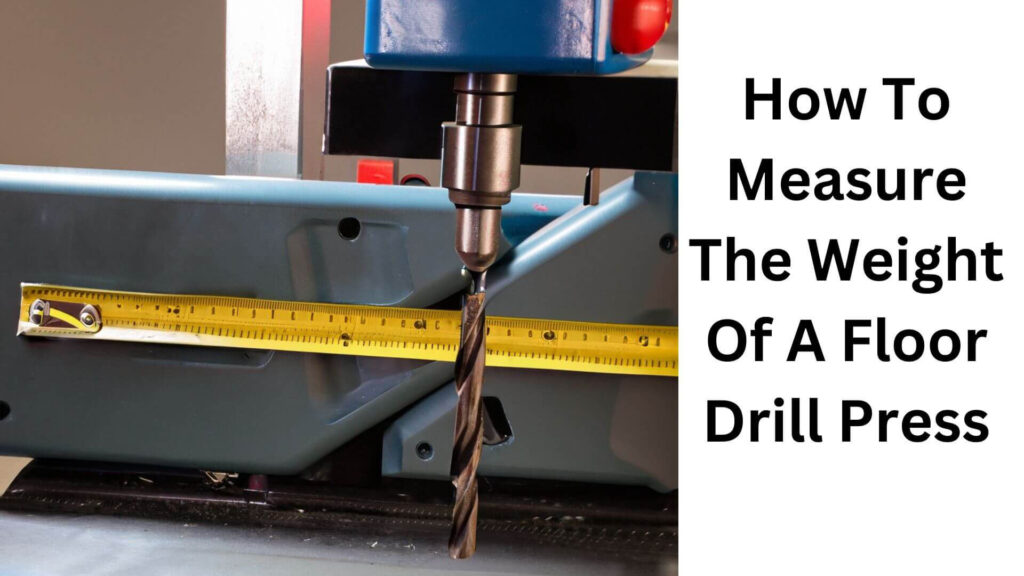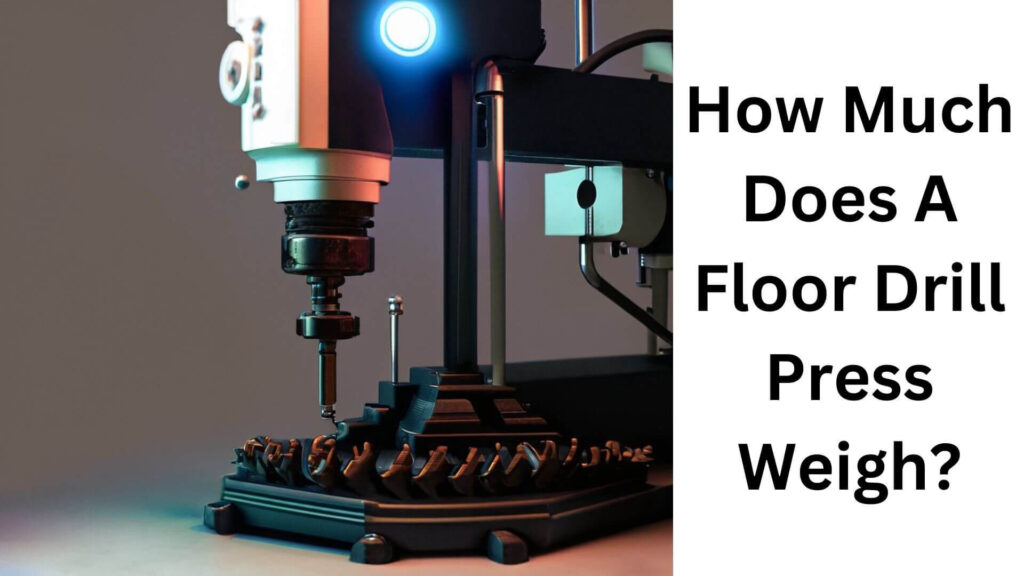If you’re planning to buy or already own a floor drill press, you may wonder about its weight and how it affects performance, setup, and usability. Understanding the weight of a floor drill press is essential for moving, installing, and operating it efficiently.
This blog post provides a detailed overview of the factors influencing the weight of a floor drill press, the benefits of knowing its weight, and how to measure it.
Table of Contents
Average Weight Of A Floor Drill Press
Before diving into specifics, let’s take a look at the general weight range of a typical floor drill press. The average weight of a floor drill press can vary depending on its size, model, and features.

Definition Of The Term “Average Weight”
The term “average weight” refers to the central or typical value of a data set. It represents the weight most common among floor drill presses and can be found by adding the weights of different drill presses and dividing the sum by the total number of drill presses considered.
The average weight helps users determine what to expect when buying a drill press, especially when comparing different models.
Source Of Information Regarding The Average Weight Of A Floor Drill Press
Manufacturers’ specifications, product manuals, and online retailer listings are common sources of information regarding the weight of a floor drill press. You can also find detailed data in product reviews, tool blogs, and comparison websites that offer insights into specific models.
While manufacturer-provided specifications are usually the most reliable, third-party reviews often share real-world experiences and may account for variations in shipping or accessory weight.
Detailed Explanation Of The Average Weight Of A Floor Drill Press
The average weight of a floor drill press typically ranges between 150 and 300 pounds. Larger industrial-grade models, equipped with extra features or more powerful motors, may weigh upwards of 400 pounds, while smaller, lightweight models designed for hobbyists or small workshops can weigh closer to 100 pounds.
Here’s a breakdown of typical weight categories based on common models:
- Light-duty floor drill presses: These are ideal for home use or small-scale operations. They usually weigh between 100 and 150 pounds.
- Medium-duty floor drill presses: Suitable for more complex tasks, these models generally weigh between 150 and 250 pounds.
- Heavy-duty floor drill presses: Designed for industrial use or more demanding projects, these presses can weigh 250 to 400 pounds or more.
The weight of a drill press is determined by several factors, including size, materials used, and additional features, which we will explore further.
Check Also: Best Floor Standing Drill Press For Home And Workshop Use
Factors That Affect The Weight Of A Floor Drill Press
The weight of a floor drill press is influenced by various factors, including its size and the materials used in its construction. Knowing these factors can help you select a drill press that best meets your needs.
Explanation Of How The Size Of A Floor Drill Press Affects Its Weight
The size of a floor drill press significantly impacts its weight. Larger drill presses, which come with taller columns, wider bases, and longer arms, are naturally heavier than compact models.
- Column Height: The taller the column of the drill press, the heavier it is. Taller columns add more material and structure, allowing for greater vertical capacity, but also increasing the overall weight.
- Table Size: A larger table on a drill press provides more support for larger workpieces but adds additional weight due to the larger surface area and sturdier construction required.
- Motor Size: Heavier models often feature more powerful motors. A larger motor adds to the overall weight, especially in models designed for high-torque applications like metalworking.
In general, the size of the drill press is directly proportional to its weight, which is something to consider when choosing the right model for your workspace.
Discussion Of Material Used In The Construction Of A Floor Drill Press And Its Impact On The Weight
The materials used to construct a floor drill press play a crucial role in determining its overall weight. Different materials offer varying levels of strength, durability, and weight.
- Cast Iron: Many floor drill presses are made from cast iron, particularly the base, table, and column. Cast iron is durable and stable, providing the necessary support to prevent vibration during operation. However, it is a dense and heavy material, which increases the overall weight of the drill press.
- Steel: Steel is another commonly used material in drill press construction. While it’s strong and provides excellent structural integrity, it is also quite heavy. Many manufacturers use steel in key components such as the spindle and motor housing.
- Aluminum: Some lighter models incorporate aluminum in their construction. Aluminum is lighter than cast iron and steel but still offers sufficient strength for light-duty applications. However, aluminum drill presses are typically lighter and less suited for heavy-duty operations.
- Plastic Components: While rare in heavy-duty models, certain lightweight or budget drill presses may have plastic components. These can reduce the weight of the machine but often sacrifice durability and stability.
When choosing a drill press, understanding the trade-off between material weight and durability is important. Heavy-duty machines built from cast iron or steel are more stable but harder to move or install.
Other Factors That Affect The Weight Of A Floor Drill Press
In addition to size and material, there are other factors that can affect the weight of a floor drill press:
Design Complexity: Complex designs with more moving parts or reinforced frames will typically weigh more than simpler models. Industrial models often feature more robust, heavy-duty construction compared to entry-level units.
Additional Features: Extra features such as digital readouts, laser guides, or built-in lighting systems can add weight. These features, while convenient, contribute to the overall mass of the drill press.
Attachments and Accessories: Certain accessories, like a cross-slide vice or adjustable fence, add weight to the machine. Some models come with a more robust set of attachments, which will make them heavier.
Benefits Of Knowing The Weight Of Your Floor Drill Press
Understanding the weight of your floor drill press can offer several advantages:
Stability and Vibration Reduction
A heavier floor drill press is more stable during operation. The added weight helps reduce vibrations, leading to more precise and accurate drilling. A machine that doesn’t vibrate excessively will produce cleaner holes and reduce the risk of tool damage or workpiece shifting.
Easier Setup and Transport Planning
Knowing the weight of your drill press is essential for planning its setup. If you’re working in a confined space or on a raised platform, you need to ensure your floor can support the weight of the machine. Additionally, if you ever need to move the drill press, knowing its weight will help you arrange the right equipment or assistance for transportation.
Matching Equipment and Workspace Requirements
Some workspaces may not be able to accommodate a heavy-duty floor drill press due to weight limitations. By understanding the weight, you can match the machine to your available space and the types of workpieces you will be handling.
How To Measure The Weight Of A Floor Drill Press

If you don’t have the manufacturer’s specifications or product manual, measuring the weight of your drill press can be challenging but not impossible.
Use a Scale
For smaller floor drill presses, a heavy-duty scale can be used. However, this method is impractical for larger machines. In that case, you can:
- Disassemble the Drill Press: Break down the drill press into its individual components (motor, table, base, etc.) and weigh each part separately. You can then add up the total weight of the components to get an accurate measurement.
Manufacturer Specifications
Most drill presses come with a product manual that lists the weight under technical specifications. If you have access to the model number or brand, you can usually find this information on the manufacturer’s website or through an online retailer.
Online Resources
Numerous websites list the specifications of floor drill presses, including their weight. Tool comparison sites, reviews, and retailers typically provide accurate weight data, allowing you to easily find the information you need.
Frequently Asked Questions For How Much Does A Floor Drill Press Weigh?
How much does a typical floor drill press weigh?
The typical floor drill press weighs between 150 and 300 pounds, with heavier models reaching up to 400 pounds for industrial-grade machines.
Why is the weight of a floor drill press important?
The weight of a floor drill press affects its stability, ease of transport, and overall performance. Heavier models tend to be more stable and reduce vibration during operation.
Can I move a floor drill press by myself?
Moving a floor drill press is not advisable without assistance due to its weight. For larger models, use a dolly or enlist help to prevent injury or damage to the machine.
What’s the lightest weight for a floor drill press?
Light-duty floor drill presses designed for hobbyists or light work typically weigh around 100 pounds.
Does the weight affect the durability of a drill press?
Generally, yes. Heavier drill presses built with cast iron and steel components tend to be more durable and stable, while lighter models may sacrifice some durability for ease of use.
Final Verdict
Knowing how much a floor drill press weighs is crucial for planning your workspace, ensuring stability during operation, and understanding the machine’s capabilities. The average weight ranges from 150 to 300 pounds, with some models exceeding 400 pounds for heavy-duty or industrial use. Factors like size, materials, and additional features influence the weight of the drill press.
Heavier models tend to offer better stability and reduced vibration, while lighter models are easier to transport and install. When purchasing or moving a drill press, always consider its weight to ensure it fits your workspace and meets your operational needs. With this knowledge, you’ll be better equipped to select, install, and operate your floor drill press effectively.

Hey, I am MD Hrithik Hossain, I’m a huge fan of DIY crafts. My workshop is where I spend most of my spare time, and I’m always working on some project. To that end, I’d like to share some of my knowledge and experience with you in power tools, woodworking, and other specialized materials fabrication.
I will guide you with genuine knowledge that can assist you with deciding whether a drill is appropriate according to your requirements or not. If you want to find the best drill and know which type of drill is most suited for your needs, then I can guide you with my expertise. My passion lies in helping others find the correct products they need at an affordable price.


